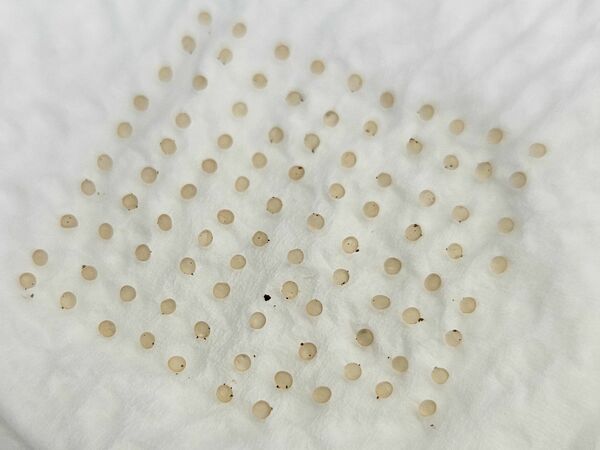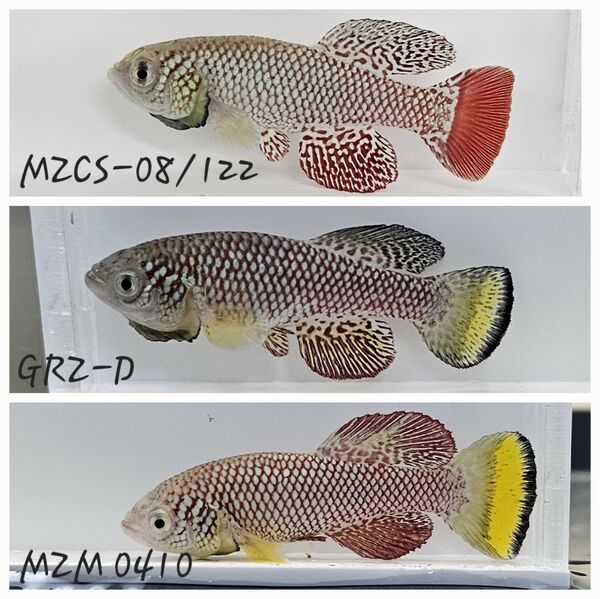Support


At the Leibniz-Institute on Aging we prioritize sustainability and ethical considerations in every aspect of our operations. We adhere to strict guidelines for the collection, handling, and shipment of fish reproductive materials to minimize stress on killifish populations and ensure the welfare of the animals involved.
We offer the following lines:
•GRZ
•MZCS-08/122
•MZM-0410
•ZMZ-1001
•Klara (MZCS-08/122 Hintergrund, GVO-Infos)
Further lines and GMOs are available on request. For more information contact Beate Hoppe
The embryonic diapause eggs are stored under optimized conditions to guarantee optimal shelf life and biological viability. This results in high quality, reliable and cost-effective diapause eggs ready to use as starter material to maintain stocks or directly for scientific research.
Shipping
•200-400 embryos per line
•Diapause II
Embryos are carefully enclosed in moisten tissue in a petri dish, with 100 embryos per dish. Our shipping process involves placing the petri dishes in a Styrofoam box with a heat pack and packaging material, resulting in consistently high survival rates, typically ranging from 80% to 100%. Every shipment includes a health monitoring certificate.
Please note that we do not aim to make a profit. However, we must charge you for our products and services to cover part of our costs.
Material Transfer Agreement/Material Delivery Agreement
Our Material Transfer Agreements (MTAs) facilitate seamless exchanges of research materials between organizations. Protect intellectual property, ensure regulatory compliance, and foster responsible scientific partnerships with our MTA. Alternatively, a MDA can be made to addresses the logistics, terms, and conditions related to the physical delivery of materials.
Handling fee
Our handling fee of 400 € per shipment covers the administrative, packaging, and labor costs involved in processing and shipping your order. This fee ensures that your items are carefully picked, packed, and prepared for secure and efficient delivery. We prioritize quality assurance and logistics management to provide you with a seamless shipping experience.
Official veterinary health certificate
For your convenience and compliance, customers are responsible for the fees associated with obtaining an Official Veterinary Health Certificate. Please note that these fees are separate from our service charges and are part of the necessary documentation process for safe and legal transportation of the fish embryos. The costs depend on the extent of authority controls and amount to approx. 100€.
Shipping charges
You will be billed for the actual shipping charges.
Ordering
To place an order or inquire about ordering details, please email Beate Hoppe at beate.hoppe@leibniz-fli.de. Be sure to include your contact information and specify your order requirements in the email. We will promptly assist you with the necessary information and processing steps.
All fish are maintained in the animal facility fish of the Leibniz Institute on Aging – Fritz Lipmann Institute Jena consistent with the German Animal Welfare Law.
Husbandry conditions include a water temperature of 27 °C ± 1 °C, conductivity of approximately 0.8 mS, and a 12:12-h light:dark cycle. Water quality parameters, including pH, temperature, and conductivity, are monitored and recorded continuously. Nitrate and nitrite are measured daily. Group-housed fish are supplied with certified contaminant-screened blue polycarbonate igloos, retreats, huts, and tents as enrichment. Permanent breeding groups consist of one male and 4 females and are provided with a sand bowl for oviposition. Embryos are collected weekly on coconut fiber substrate and incubated at 23 °C in dedicated incubators.
Freshly hatched larvae are fed twice daily with live first instar brine shrimp nauplii (Artemia sp.) and then weaned at the age of 4 to 6 wk onto live bloodworms (Chironomidae) once a day. Fish are tracked on an individual basis by using the commercially available database Tick@lab. Fish are visually inspected daily by animal technicians with reference to the killifish health score sheet (Naumann et al., 2023). Health scores of fish exhibiting clinical signs were documented in Tick@lab.
The routine quarterly killifish colony health surveillance program incorporates both molecular methods using whole fish (sentinels) and environmental samples (sump) for molecular analysis and whole fish for histopathology (sentinels). Adult postfiltration sentinel N. furzeri are placed in sentinel tanks in each rack for a minimum exposure period of 3 mo. Sentinels are euthanized by hypothermal shock (rapid chilling) or overdose with buffered tricaine methanesulphonate (MS-222, 1g/L) and submitted to IDEXX BioAnalytics (Columbia, MO) for individual evaluation by histopathology, pooled into groups of 5 for evaluation by real-time PCR, or analyzed individually in-house by conventional PCR for microsporidia. Each health monitoring round samples 2.7% of the entire fish colony. In addition, biofilter samples are collected from the sump of each rack as environmental samples and are processed individually by real-time PCR.

- Singapore
- Australia
- USA
- Chile
- Italy
- Sweden
- Netherlands
- Belgium
Contact

Dr. Beate Hoppe
Head Animal Facility Fish
+49 3641 656138
beate.hoppe@~@leibniz-fli.de









